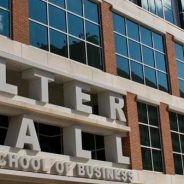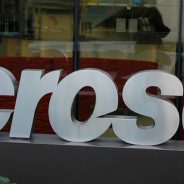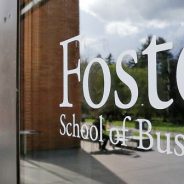Search results for :
UTA College of Business Named Best Business School by Princeton Review
The University of Texas at Arlington – College of Business was recently named one of the “best” business schools in the Princeton Review‘s 2017 “Best 294 Business Schools“.
Diversity and Inclusion at USC Marshall
There’s no doubt that interacting with classmates is one of the best parts about attending an MBA program. That’s because when you surround yourself with excellence, you can’t help but excel yourself. And that’s definitely true at the USC Marshall MBA program. Not only are all Marshall MBA candidates top-tier, but they also arrive with a diversity of ideas and opinions that truly enrich the entire experience. In fact, according to the most recent class profile, 32 percent of the MBA class is composed of women, 32 percent are from outside of the U.S. and 13 percent are underrepresented minorities. Continue reading…
Top 10 Employers in Seattle
The Seattle metro has earned a reputation as a cultural hub with abundant employment and easy access to natural splendor continues to lure new denizens to the Emerald City, which now boasts a population of over 650,000.
Continue reading…
Sellinger Earns High Ranks from Princeton Review, U.S. News
According to a news release, Loyola University Maryland’s Sellinger School of Business and Management has been named in the latest edition of The Princeton Review’s “Best 294 Business Schools.” Continue reading…
McNair Center for Free Enterprise & Entrepreneurship Introduces Minor
The University of St. Thomas – Cameron School of Business has just announced a Free Enterprise & Entrepreneurship minor, available to students through the McNair Center for Free Enterprise & Entrepreneurship.
MBA Programs in Philly That Don’t Require Work Experience
Not everyone comes from a traditional working background earns an MBA for the same reason. So, in the same ways that some MBA programs don’t require the GRE or GMAT score for their applications, some business schools are also willing to consider applicants with limited or no prior professional experience.
Business schools in the Philadelphia metro are no stranger to MBA programs that don’t require work experience. Continue reading…
Inside Rice’s MBA Student Government Leadership Summit
Top-notch MBA programs aren’t just about coursework; they’re about the entire experience. Classroom learning can only take you so far. Employers want more than good grades and lecture attendance. They want practical experience, and that’s why the Jones Graduate School of Business at Rice University recently held an MBA Student Government Leadership Summit. Continue reading…
Top Entrepreneurship MBAs in Houston
Do you ever feel like making like Fleetwood Mac and “Go Your Own Way” in the business world? If that’s the case, you’re not alone: According to a study conducted by the University of Pennsylvania, researchers polled more than 30,000 Wharton School graduates and found that more than 7 percent of 2013 grads started their own companies right away. This study fits into a growing national trend of business school students going the entrepreneurial route. Continue reading…
Best Places to Intern in Houston
Most students pursuing an MBA in Houston already know that success comes from what happens both in and outside of a classroom. The value of networking, competitions and internships is almost immeasurable—but not quite.
Smith Faculty Lend Their Expertise in Interviews With the Media
Professors from the Robert H. Smith School of Business often serve as experts in the media. Here are a few excerpts of various faculty members sharing their knowledge on a range of business topics. Continue reading…
Bauer MBA Students Get Firsthand Look at Texas Fortune 500 Companies
This November, full-time MBA students at the University of Houston – C.T. Bauer College of Business got a firsthand look into the operation of three Fortune 500 companies.
Professor to Know: Alex Edmans, London Business School
There’s one thing that every top business school around the world has in common: impressive faculty. That’s because MBA programs know that their offerings are only as exceptional as their professors, and that’s definitely the case at the London Business School.
Faculty at LBS are at the forefront of innovative business thinking. They’re influential business leaders, managers and policy makers who conduct world-class research and teach topnotch courses. In fact, according to a recent review published in 2014, London Business School received a top four rating for its research performance. And there’s no better representation of LBS’s faculty than finance professor Alex Edmans.
About Professor Alex Edmans
Professor Edmans graduated from Oxford University in 2001 with his bachelor’s degree in Economics and Management. From there, he pursued a career at Morgan Stanley working in investment banking and fixed income sales and trading. Then, a few years later in 2003, he went back to school to receive his Ph.D. in Finance from MIT Sloan as a Fulbright Scholar. In 2007, he became a professor at Wharton, earning his tenure by 2013 before moving to LBS. And, so far, Professor Edmans’ teaching career has been prestigious.
Over the past six years, he’s won 14 teaching awards. At Wharton, he was the highest-rated finance professor in the MBA program before his departure and was even chosen as the Faculty Graduation Speaker to the MBA class of 2014. And then, just this year at LBS, he was given the MBA Class of 2016 teaching award for the highest-rated professor school-wide and the Best Teacher: MBA 2016 award.
Outside of his exceptional teaching, Alex Edmans is a prolific researcher, blogger and Twitter user (you can follow him @aedmans). His blog, Access to Finance, covers a variety of topics and excels at making finance research available to anyone and everyone. It’s written for people with a non-finance background who might not normally be interested in finance but want to stay on top of current trends and events.
As for Edmans’ research, his most recent publication was published in the Journal of Financial Economics on October 27, 2016. Titled “The Source of Information in Prices and Investment-Price Sensitivity,” it discusses the value of financial markets to the real economy. Other research topics have included “Equity Vesting and Investment,” “Blockholders” and “Governing Multiple Firms.”
As you can see by just the most basic facts, Alex Edmans isn’t an ordinary professor. But that’s just the surface. We wanted to get to know Professor Edmans, so we asked him five questions about his life and work as a faculty member at the London Business School.
- What do you love most about teaching at the London Business School?
I really enjoy the diversity of the student body—not just nationalities, but also educational and career backgrounds. This brings lots of different perspectives to class.
I also enjoy the fact that I teach core courses. It’s easy to teach an elective since students have self-selected into the class, so you know they’ll like it. The core is challenging because I teach students who may not like finance, may even be scared of finance, and only take it because they have to. I like this challenge. It means that I have to make finance interesting and accessible, and hopefully, students end up enjoying the class even if they dreaded it to start with.
- What do you hope students take away from your research, teaching, and speaking?
Teaching: I would like students to be able to think for themselves and understand the intuition behind the concepts, which they can apply to any real-world situation—rather than just knowing the formulas that they can plug numbers into in order to solve an exam problem.
Research: The importance of large-scale, rigorous, academic research in a world where policy is increasingly formed on anecdote or myth. That “academic” research isn’t irrelevant but has substantial relevance for the real world.
Speaking: I give a number of talks on personal leadership, not just finance. I would like students to choose careers that are personally fulfilling, rather than just the career that happens to be hot at the moment. And I would like students to be mentally present in everything they do, not just physically present.
- In an era where corporate responsibility is becoming more important than ever, what do MBAs need to know and keep in mind?
That companies should do things for intrinsic and not instrumental value—even if there is no clear profit benefit for an action. This applies to your personal life too—to help a classmate even if you don’t clearly benefit from it, or learn something even if it won’t be on the exam.
- Which of your blogs would you most recommend for MBAs to read?
My blog, Access To Finance, aims to make finance accessible to a general audience by taking complex academic papers, or topical issues (such as Brexit or the current debate on executive pay), and making them simple. Which articles in the blog to read depends on the MBA’s interest, and so it’s hard for me to recommend some over others. My Twitter feed @aedmans also aims to showcase simple, accessible articles on real world finance.
I would also recommend two talks that I gave which may be of particular interest to MBAs. One is my TEDx talk, “The Social Responsibility of Business”, on the business case for sustainability, and the other is “Fulfilling Careers and Full Lives”, the final lecture of my MBA course, which is similar to a graduation speech in that it provides general advice for how MBAs can make the most of their talents and opportunities to serve society, but aims to do so in a concrete and actionable rather than sugary and saccharine way.
- What makes your teaching/classes different at LBS?
In every class, I have an “extra-curricular break,” which takes a complex academic paper with real-world relevance and makes it accessible for a practitioner. Indeed, my blog spun out of these extra-curricular breaks.
- While a core class is theoretical and rigorous, I always try to emphasize the evidence to the real world, drawing from my own practitioner and policy experience.
- I cold-call students. This is absolutely not to scare them, but to keep the class interactive and the students engaged, and to give the students practice in solving problems themselves, rather than just following someone else. It also ensures the pace of the class is not dictated by the students with finance backgrounds; cold-calling means that a broad set of students end up contributing.
- I play music before class and during the breaks, and dress down. This is absolutely not intended to be a gimmick. Instead, it is to conduct class in as relaxed an atmosphere as possible, to make students relaxed about asking questions and not be afraid to be cold-called. The music aims to bring energy to the class, which is particularly important when studying finance at 8:15 am on Monday morning!
Fox Temple Earns Top 10 In Princeton Review, Entrepreneur Magazine
Among Philadelphia’s ever-growing list of exceptional business schools, the Fox School of Business at Temple University has earned the right to stand out.
In the 2017 list of the nation’s best entrepreneurship MBA programs for undergraduates and graduates from the Princeton Review and Entrepreneur Magazine, Fox Temple was the only school in the city to earn both honors—earning its way into the top 10 for each list.
This is the second year in a row Fox Temple managed to secure rankings on each list, coming in at 8th overall for its undergraduate program and 9th for its graduate program—one spot higher than last year.
“It’s rewarding to see our entrepreneurship programs recognized nationally, and in the company of prestigious schools,” said dean M. Moshe Porat shortly after the rankings were announced in mid-November. “Entrepreneurship education is a pillar across Temple University, and we at the Fox School are proud to lead this charge. More and more resources have been made available to students from all 17 schools and colleges at Temple. Our mission is to prepare and encourage students to think and act like entrepreneurs, no matter where their careers guide them.”
Topping this year’s list, unsurprisingly, was Harvard Business School, followed shortly after by the F.W. Olin Graduate School of Business at Babson College, the Jesse H. Jones Graduate School of Business at Rice University, the Kellogg School of Management at Northwestern and Booth School of Business at the University of Chicago to round out the top five.
The list was compiled after examining surveys from over 300 schools between May and August of 2016. The final tabulation considered academics and requirements, students and faculty, alumni entrepreneurship ventures, how students worked outside of the traditional classroom setting, school competitions and scholarships/aid.
The news of Fox Temple’s newest honor follows a successful string of accolades through various other authorities, including the Financial Times, which named the school’s Executive MBA program as the 18th best in the U.S. Check out some of Fox Temple’s other prestigious honors here.
Top MBA Recruiters: Microsoft
Past, present and future business school students lured by the siren song of the tech industry should look no further than Microsoft, the $407 billion semi-benevolent techno giant that employs nearly 100,000 from its Redmond, Washington headquarters.
Continue reading…
5 Best Finance MBAs London
London’s economy is built upon finance. In fact, the city is considered the world’s leading financial centeer. It’s the largest financial exporter in the world, and the city is home to exchanges, banks, brokers, investment managers, pension funds, hedge funds, insurance companies and more crucial financial positions. It’s also an important center of international finance, being home to the Bank of England—the second oldest central bank in the world. And in 2009, London handled 36.7 percent of global currency transactions.
So, there’s no doubt that London is a great place to live, work and gain an education if the finance industry is your preference. But how do you join the 315,200 people who work in London’s financial services sector? First, it’s about finding the right school for your education.
London has a variety of schools that offer an exceptional Finance MBA program. We’ve outlined the top five below along with why we think each program stands out in the crowd. Continue reading…
USD Launches New Business School Website
The ease of which you can find and digest information about a potential MBA program is key to helping you make your choice. If a school makes it difficult to locate the program you want and the details you need, then you’re more likely to choose another program. And that’s exactly why the University of San Diego School of Business Administration recently updated its website.
According to a press release from the university, the updated website aims to deliver information to prospective students exploring graduate and undergraduate business degree and career options. And it was designed with users in mind.
“We surveyed prospective undergraduate and graduate students, and later in the project conducted a usability study with our prospective audience to ensure the design and intended usability appealed to their needs,” explained the university.
Some of the features of the new website include:
- Responsive design that works for mobile, tablet and desktop devices, so students can access USD anytime and anywhere.
- A looping video showcase feature that shows the USD campus and school and, in the future, will be used to show videos of inspiring speakers and important announcements and advancements.
- A new “global impact” home page that demonstrates USD’s excellence around the world.
- An updated faculty and staff web page, which has a new filtering feature as well as an ability to search. Each faculty and staff member listing also comes with more research information and larger photos.
- A “study abroad system” for students to quickly and easily see what international options are available based on specific search options.
- A newly updated course catalog, which provides up-to-date course information.
- A new news center, events calendar, and blog site to share information about the school, faculty and related centers.
- A social media hub, which aggregates all of USD’s content from all of its social profiles.
- Finally, all content has been rewritten and edited for optimal readability.
To take a look at the new USD School of Business website, visit it now.
Kellogg-Schulich EMBA Program Celebrates 15 Years
To celebrate 15 years of success, the Kellog-Schulich Executive MBA program hosted its annual alumni gala at the historic University Club of Toronto. The event was an incredible opportunity to bring together over a decade’s worth of global alumni—over 80 in total—and to commemorate the EMBA program’s years of achievement. Continue reading…
Foster Difference Fund Increases Diversity
According to UW Today, the 2016 University of Washington fall class was the most diverse yet. The university welcomed 976 underrepresented students, a new record number. But that’s not the only place where the university is encouraging diversity. The Foster School of Business also promotes diversity, and thanks to the Foster Difference Fund, the school was recently able to launch a few new initiatives and partnerships to help them reach their goal of inclusiveness. Continue reading…


















